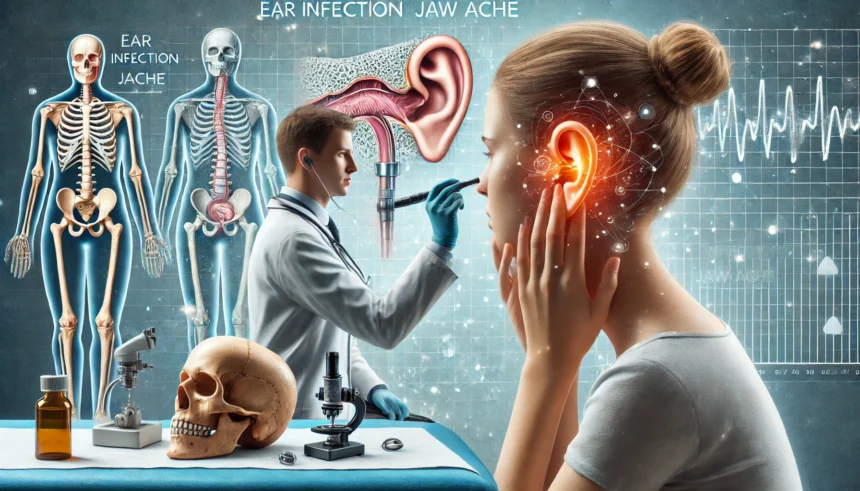Have you ever experienced ear pain that seems to radiate to your jaw? Or perhaps a persistent jaw ache that’s accompanied by a dull earache? These symptoms, often referred to together as ear infection jaw ache, are more connected than you might think. Understanding their causes, symptoms, and treatments can help you find relief and take proactive steps to protect your health.
Causes of Ear Infection and Jaw Ache
Middle Ear Infections (Otitis Media)
Middle ear infections occur when fluid builds up behind the eardrum, often due to colds or allergies. This buildup can cause pressure and pain, which sometimes extends to the jaw due to shared nerve pathways, particularly the trigeminal nerve.
Temporomandibular Joint (TMJ) Disorders
The temporomandibular joint connects the jawbone to the skull. If this joint becomes inflamed or misaligned, it can lead to pain that radiates to the ear. TMJ disorders are a common cause of ear pain that isn’t linked to an infection.
Eustachian Tube Dysfunction
The Eustachian tube connects the middle ear to the throat and helps regulate ear pressure. When it becomes blocked, you might experience ear discomfort and jaw tension due to the pressure changes.
Dental Issues
Tooth problems like cavities, abscesses, or grinding (bruxism) can lead to referred pain in the jaw and ear. A dental infection near the jaw can mimic the symptoms of an ear infection.
Sinus Infections
Inflamed sinuses can create pressure around the ears and jaw, resulting in discomfort in both areas. This is particularly common with upper sinus infections.
Neuralgia
Conditions like trigeminal neuralgia, which cause sharp, shooting pain along the trigeminal nerve, can affect both the jaw and the ear.
Symptoms of Ear Infection and Jaw Ache
Common symptoms include:
- Earache or a feeling of fullness in the ear.
- Jaw pain, tenderness, or difficulty chewing.
- Clicking or popping sounds when moving the jaw.
- Hearing loss or muffled hearing.
- Swelling or redness around the ear or jaw.
- Dizziness or fever in the case of infections.
Differentiating between these symptoms is key to identifying the underlying cause and seeking appropriate treatment.
Diagnosis
If you’re experiencing persistent ear or jaw pain, consulting a healthcare provider is essential. Diagnostic steps may include:
- Ear Examination: Using an otoscope to check for signs of infection.
- TMJ Assessment: Evaluating jaw movement and tenderness.
- Dental Evaluation: Checking for cavities, abscesses, or bruxism.
- Imaging Tests: X-rays, MRIs, or CT scans for a detailed view of the affected area.
Treatment Options
For Ear Infections
- Antibiotics, if the infection is bacterial.
- Over-the-counter pain relievers like ibuprofen or acetaminophen.
- Warm compresses to reduce pain and inflammation.
For TMJ Disorders
- Jaw exercises to strengthen and relax the joint.
- Bite guards to prevent teeth grinding.
- Anti-inflammatory medications for pain relief.
For Dental Issues
- Addressing cavities or abscesses with fillings or root canals.
- Stress management techniques to reduce teeth grinding.
Home Remedies
- Warm or cold compresses applied to the affected area.
- Over-the-counter pain medications for temporary relief.
- Gentle jaw stretches to ease tension.
Prevention Tips
- Maintain proper ear hygiene to reduce the risk of infections.
- Treat dental issues promptly to avoid complications.
- Practice stress-relief techniques like meditation to reduce jaw tension.
- Use a mouthguard if you grind your teeth at night.
When to See a Doctor
Seek medical attention if:
- Pain is severe or persistent.
- You have a fever or drainage from the ear.
- Swelling or redness develops near the ear or jaw.
- You experience hearing loss or dizziness.
Conclusion
Ear infections and jaw aches, commonly referred to as ear infection jaw ache, are often interconnected due to the shared anatomy of the ear and jaw. Understanding the causes, symptoms, and treatments can empower you to take action and find relief. If you experience persistent pain, don’t hesitate to consult a healthcare professional to determine the root cause and receive appropriate care. Prioritize your health and seek timely treatment for lasting comfort.
Frequently Asked Questions (FAQs)
Can an ear infection cause jaw pain?
Yes, an ear infection can cause jaw pain due to shared nerve pathways, such as the trigeminal nerve, which connects the ear and jaw, leading to referred pain.
How can I tell if my jaw pain is related to an ear infection?
If your jaw pain is accompanied by earache, hearing loss, or a feeling of fullness in the ear, it may be linked to an ear infection. Consulting a healthcare provider can help confirm the cause.
Are TMJ disorders and ear infections connected?
TMJ disorders often mimic the symptoms of ear infections, such as earache and jaw discomfort, because the temporomandibular joint is located near the ear.
What are the best treatments for ear infection jaw ache?
Treatment depends on the cause but may include antibiotics for infections, anti-inflammatory medications for TMJ disorders, or dental care for tooth-related pain.
When should I see a doctor for ear infection jaw ache?
You should see a doctor if the pain is severe, persistent, or accompanied by fever, ear drainage, swelling, or hearing loss, as these may indicate a serious condition.
Recommended Article:
A Comprehensive Guide to Ape Mushrooms: Potency, Uses, and Benefits
Does Weed Give You Acne? Understanding the Connection between Marijuana and Skin Health
Chest Pain After Drinking Alcohol: Causes, Prevention, and When to Worry








